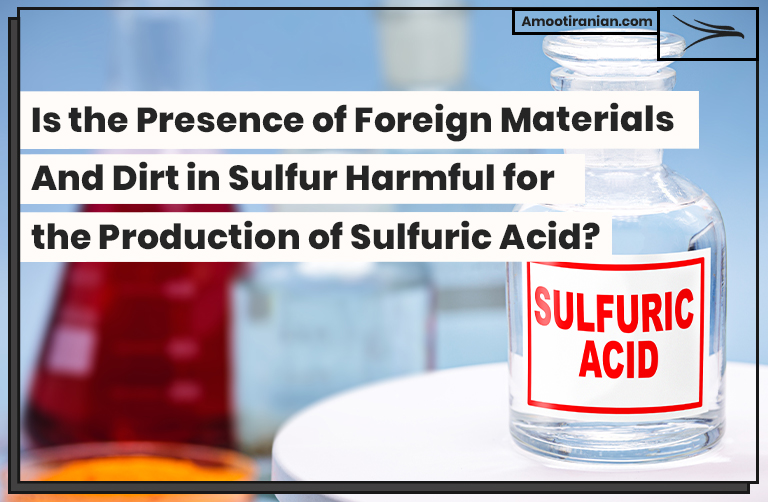
The presence of foreign materials and dirt in sulfur can be harmful to the production of sulfuric acid.
Sulfur used in the production of sulfuric acid must be of high purity, with a sulfur content of at least 99.5%.
.
.
.
This is because impurities, such as metals, oxides, and other substances, can interfere with the production of sulfuric acid and reduce its quality.
.
How Do Impurities Harm The Sulfuric Acid Production?
Impurities in sulfur can react with oxygen during the combustion process, producing oxides and other compounds that can contaminate the sulfur dioxide produced.
These impurities can then carry over into the subsequent steps of the process and interfere with the production of sulfuric acid. In addition, impurities can also affect the performance of catalysts used in the process and reduce their effectiveness.
Foreign materials and dirt in sulfur can also cause problems during the handling and transportation of sulfur, as they can clog pipelines and equipment and increase the risk of accidents and spills. Therefore, it is important to ensure that sulfur used in the production of sulfuric acid is of high quality and free from impurities and foreign materials.
.
How to Separate Impurities from Sulfur for the Production of Sulfuric Acid?
There are several methods used to separate impurities from sulfur to obtain high-purity sulfur for the production of sulfuric acid. Some of the commonly used methods are:
__Froth Flotation
This process involves mixing crushed sulfur with water and a frothing agent, then blowing air through the mixture to create a froth. The impurities in the sulfur adhere to the froth and are separated from the sulfur.
__Magnetic Separation
This method involves passing a stream of molten sulfur through a magnetic field, which separates any magnetic impurities from the sulfur.
__Filtration
This process involves passing molten sulfur through a filter to remove any solid impurities. The filtered sulfur is then further purified through distillation.
__Oxidation
Some impurities in sulfur, such as iron and copper, can be oxidized to their oxides by treating molten sulfur with nitric acid or hydrogen peroxide. The resulting oxides can then be removed from the sulfur by filtration.
__Chlorination
This method involves treating molten sulfur with chlorine gas to remove impurities, such as arsenic and antimony. The impurities react with the chlorine gas to form volatile compounds that can be removed by distillation.
After the impurities have been removed, the purified sulfur can be used in the production of sulfuric acid. It is important to ensure that the sulfur used is of high purity to prevent contamination of the sulfuric acid and ensure high-quality production.
.
Does the Presence of Impurities In Sulfur Reduce the Value of the Produced Sulfuric Acid?
The presence of impurities in sulfur can reduce the value of the produced sulfuric acid. Impurities in the sulfur can affect the quality and purity of the sulfuric acid, which can impact its usability and value.
Impurities in sulfur can cause several problems during the production of sulfuric acid. For example, impurities can react with oxygen during the combustion process, producing oxides and other compounds that can contaminate the sulfur dioxide produced.
These impurities can then carry over into the subsequent steps of the process and interfere with the production of high-quality sulfuric acid.
In addition, impurities can also affect the performance of catalysts used in the production of sulfuric acid, reducing their effectiveness and leading to lower yields and lower-quality sulfuric acid.
Impurities can also cause corrosion of equipment and pipelines used in the production process, increasing maintenance costs and reducing the overall efficiency of the process.
Therefore, it is important to ensure that the sulfur used in the production of sulfuric acid is of high purity and free from impurities. This can help to ensure the production of high-quality sulfuric acid, which can have a higher value and be more widely used in various industrial applications.
